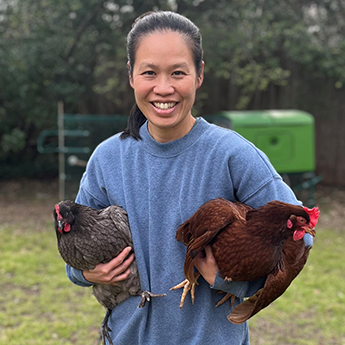Member of the Month: Judy Kim, MD
Austin physician focuses on underserved patients
By Samantha White

Two major factors led Judy Kim, MD, to her current family medicine career in Austin: growing up with a family physician as a mom and completing a well-rounded family medicine rotation during medical school. After working as faculty at a medical home for patients with intellectual and developmental disabilities, she knew that a medically underserved patient population was who she wanted to serve. She has spent most of her career doing just that.
Tell us about your career path.
As a liberal arts and business major at UT Austin, I briefly flirted with the idea of a career outside of medicine. But I soon realized that a career in medicine was more fitting for my personality and desire to impact the lives of others. After completing residency, I returned to Baylor College of Medicine as faculty at the Transition Medicine clinic — a medical home for adults with intellectual and developmental disabilities. My experience there was transformative and opened my eyes to the unique needs and challenges that adults with IDD face. While I loved serving that population of patients, my husband and I felt the pull to move back to Austin, our hometown. Since moving back, I have been working at People’s Community Clinic, a federally qualified health center, and have enjoyed being back in the community and providing care for medically underserved and underinsured individuals.
Who or what inspired you to become a family physician?
My mom is a family physician in Austin, and for as long as I can remember, she has exemplified the heart of family medicine: genuine care for people, love for learning, and a desire to positively shape the community. While I’m certain she had challenging moments in her career, I mostly saw the joy she had in getting to use her time and skills in a way that had a direct impact on the lives of others. I entered medical school at Baylor College of Medicine with an open mind and truly enjoyed every rotation. Then I had the privilege of doing my family medicine rotation with Larry Kravitz, MD, in Austin, and I was hooked on family medicine. During my four-week rotation, Dr. Kravitz showed me the breadth of services that family physicians can provide. I got to experience a busy outpatient clinic, in-office procedures, urgent care service, and serve alongside Dr. Kravitz as Physician of the Day at the Capitol and as team physician for the Texas Stars hockey team. It was an amazing experience.
What unique challenges are represented in your patient community?
Many of my patients face common challenges of financial, housing, and/or food insecurity, history of trauma, language barriers, transportation barriers, and low literacy and health literacy. These social challenges have a significant impact on my patients’ physical and mental health and ability to engage with care. I am often humbled by the resilience that I see in many of my patients, especially when I better understand their unique personal stories. It is a daily challenge to address my patients’ needs and concerns within the constraints of 15 to 30 minutes, so I’m extremely grateful to work alongside a team of nurses, MAs, health educators, social workers, and counselors. Primary care truly is a team sport.
You do a lot of medical-related volunteer work. Why do you think it's important that family docs be active community members in their local areas?
Outside of my clinical practice, I’m a volunteer clinical director for Special Olympics Texas. Through SOTX, I have been able to continue to serve individuals with intellectual and developmental disabilities, primarily through providing free sports physicals at MedFest events. Individuals with IDD face unique challenges in transitioning out of pediatric care and into adult primary care. I truly believe family physicians are well trained and positioned to care for such individuals throughout their life span. Thus, it is important for family physicians to be engaged in the community to help connect individuals to primary care who might not otherwise know how or be able to access care.
Why do you choose to be a TAFP member?
I’m grateful for the community of like-minded physicians and community members that TAFP has introduced me to. My engagement with TAFP started through the Family Medicine Leadership Experience, which provided ongoing opportunity to meet and learn from other family docs serving and practicing in different ways throughout the state. It has been fun seeing how different FMLE alumni have continued to serve, advocate, and lead in their communities. I also appreciate the CME events organized by TAFP; they have offered a cadence of learning throughout the year that is high yield and are fun opportunities to connect with other family physicians.
What do you enjoy doing outside of medicine?
I love spending time with my family and being outside (hiking, gardening, biking, etc.). This past summer I learned how to fly fish, and we got chickens! I have since discovered chicken keeping as a new and eggs-tremely productive hobby.
TAFP’s Member of the Month program highlights Texas family physicians in TAFP News Now and on the TAFP website. We feature a biography and a Q&A with a different TAFP member each month and his or her unique approach to family medicine. If you know an outstanding family physician colleague who you think should be featured as a Member of the Month or if you’d like to tell your own story, nominate yourself or your colleague by contacting TAFP by email at tafp@tafp.org or by phone at (512) 329-8666.